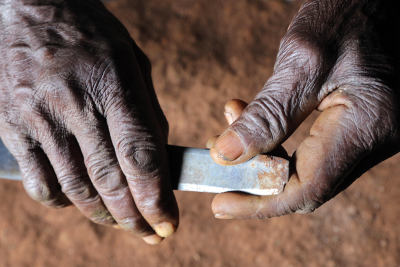Using AI to control energy for indoor agriculture
30 September 2024
Published online 23 October 2016
Dramas that raise local arguments against dangerous practice could bring change.

© Friedrich Stark / Alamy Stock Photo
The practice remains widespread despite efforts from governments and international organizations to stop it.
Kawther Alkholy, director of Egypt’s Noon Center for Women and Family Issues, says current approaches taken by some international organizations are perceived as having a negative impact on the family unit in Arab countries.
Recent research suggests that the idea of local attitudes toward FGM being uniform and entrenched in the culture was wrong. Sonja Vogt, from the University of Zurich’s department of economics, says “there is tremendous local variation in attitudes and behaviour” towards the practice, even within households. “We wanted to exploit this variation and trigger an attitudinal change with respect to cutting.”
Vogt and her team produced, in collaboration with colleagues in Sudan, four 90-minute movies with a similar plotline involving a mix of love, intrigue, deception and forgiveness.
One movie contained only the main plot and was used as a control. The other three also included 27-minutes-worth of subplots on female genital cutting. One focused on how cutting related to values such as health, purity, and religious obligations. The second focused on how it affects a girl’s chances of getting married. And the third combined content on values and marriageability.
All movies featured Sudanese characters representing members of a large extended family.
FGM was discussed openly among family members and diverging opinions were introduced. After a process of debate and negotiation, the family decides to abandon cutting. “Dramatizing local discord in this way can normalize negotiations about cutting within a family and provide a model for how to resolve these tensions in favour of improved attitudes towards uncut girls and perhaps even abandonment [of the practice],” explains Vogt.
The team measured attitudes about female genital cutting before and after showing the movies to people from 122 Sudanese communities.
They found the movies led to a more positive attitude towards uncut girls. “In the combined movie in particular, this attitude change lasted at least one week,” says Charles Efferson, one of the study’s co-authors. “This is a very soft method with real potential to lead to long-term changes. Repeated exposure, for instance, could prolong and maybe intensify the effects. Both arguments [values and marriageability] need to be present to trigger change over longer periods of time,” he says.
Specialists in neighbouring Egypt, where 91% of females aged 15 to 49 are estimated to have undergone genital cutting, agree that locally-produced dramas could change attitudes.
“Egyptians generally enjoy dramas and telenovellas. They are also headstrong and don’t like things imposed on them. This method could be effective, but the diversity within Egypt would need to be studied first,” says Sahar Talaat, professor of pathology at Cairo University , and also a trainer specialized in marital and sexual relationships.
Talaat explains that motives for FGM in Egypt include, for example, families being incapable of challenging the family matriarchs; perceptions that the practice is a part of a girl’s maturity; repulsion among some men by the idea of an uncut wife; and economic reasons: financial gifts are often received as part of the FGM ceremony.
In 2015, the Arab Women Organization, an Arab League entity, awarded Noon Center for Women and Family Issues in Egypt second place in the category of best visual media production for its cartoon series titled “Women’s Issues in Islam”, which included a short episode on FGM produced in collaboration with Egypt’s Programme for Family Empowerment and Abandonment of Female Genital Mutilation.
“The start of the road towards eliminating this harmful practice is developing new approaches that are consistent with the environmental and cultural characteristics of peoples,” says Alkholy.
doi:10.1038/nmiddleeast.2016.192
Vogt, S. et al. Changing cultural attitudes towards female genital cutting. Nature http://dx.doi.org/10.1038/nature20100 (2016).
Stay connected: